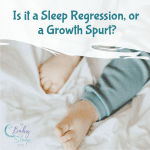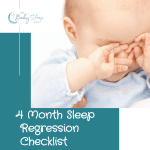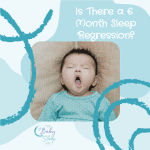
We’ve written quite a bit about sleep regressions on this site. In fact, I was instrumental in coining this term over 15 years ago! We write a lot about this topic for a good reason. Your child goes through at least FIVE sleep regressions in the first year of life alone.
But how can you know for sure if something is a sleep regression?
How do you distinguish a sleep regression from a growth spurt?
What about a sleep regression vs. a funky phase that has no real explanation?
How do you distinguish poor sleep due to a sleep regression from the kind of poor sleep that is the result of a newly formed bad sleep habit?
Sleep Regression? Phase? Habit? How is a tired parent to tell the difference? Read on for answers!
Sleep Regressions – What You Need To Know
Before we launch into this article, it might be helpful to offer a bit of background information about sleep regressions.
One primary benefit we have over other parents is YOUR experience. What we mean by that is that we’ve helped countless parents. We see patterns that most parents don’t have the luxury of seeing. We’re about to benefit from your experience and know the potential pitfalls to look out for. We glean these not only from our own experience as parents but from all of yours, too. It’s actually very interesting to put it all together!
Ages for Sleep Regressions
Our experience tells us that MANY babies and toddlers will have sleep troubles around the same time:
- 4 month old sleep regression – This is probably one of the biggest trouble spots for many new parents (though only some will consider it a sleep problem until 6 months, waiting for a baby to “get over it”). The way your baby sleeps fundamentally changes and it never changes back!
- 8 month old sleep regression – This one is another big one, but doesn’t always happen in the eighth month. This can be around 8, 9, or 10 months and usually related to a lot of development going on with your baby. This usually gets better a few weeks later, though it’s easy to develop new long-term habits trying to deal with it.
- 11-12 month old – We hear about this one fairly often but not enough to say it’s a “big” problem for all families. Around 11 months old, we have found that some babies will start fighting one or both naps and then it will pass 2-3 weeks later.
- 18 month old sleep regression – This is a common age to hear from parents about their toddler’s sleep, usually related to napping, night waking, and testing limits or questions about discipline.
- 2 year old sleep regression – Around this age, I find many parents writing to me about bedtime getting later, which is common at this age, especially in the summer.
These are all very common trouble spots and, as we always say, the biggest “danger” with these times is to make new long-term habits such that something that would have been temporary becomes a long-term sleep problem for you and your baby.
Are there other challenging times? You bet! The first two years (sometimes three) are difficult, regardless, but around 7 months, your baby begins developing separation anxiety, then there is teething, of course, and other issues like that come up here and there. Some will simply be more sensitive to all the changes than others.
A Little Bit About Nicole’s Experience With Sleep Regressions
The primary benefit I have is I have worked with thousands of children over the years. Sure, I have my own personal experience with my son who inspired this website, but now that I’ve helped countless parents and have worked with families every day for 15+ years, I see patterns that most parents don’t have the luxury of seeing. I am also very analytical, so I connect things that others may not. I benefit from your experience and know the potential pitfalls to look out for, not only from my own experience, but from all of yours, too!
Sleep Regression or Sleep Phase? How To Tell The Difference.
What Is a Sleep Regression?
First, we should explain that “sleep regression” is a term that people use to say, “Sleep messes up at this time, but don’t worry it will go back to normal.” A sleep regression lasts around 3 to 6 weeks and your child will wake up at night and/or take short naps during this time.
Regressions Have Special Features…
But, a “regression” implies that something will go back to how it once was and, in that regard, only the “8-month sleep regression” fits the definition. 18 months is a close second, but if you aren’t careful, that strong independence-seeking stage can bleed into two and three years old and that’s a heck of a long “regression!”
Remember, at 4 months, your baby changes how they sleep. While some will then begin to sleep better without you changing anything, they will never sleep the way they did when they were a newborn.
By contrast, at 8 months, this is generally a “blip” due to rapid development and the simple inability to sleep with so much going on in their minds. As long as you don’t inadvertently make some new long-term habits, your baby most likely will get past this in 3 to 6 weeks and go back to how they were sleeping before. If it was bad before, though, that may not be very desirable!
What Is a Phase?
Every other “blip” in your baby’s sleep we would call a “phase.” Generally speaking, there are two distinct causes for a sleep phase: either your child is working on a new developmental milestone (whether you can see it or not), or your child’s external environment is changing in some way that impacts sleep.
Now, sleep regressions happen due to development – but not all development is linked to a full-blown sleep regression.
Your baby learns a LOT in a short amount of time! Just to name a few… They learn names of objects and people, how to roll, crawl, pull up, stand up, sign language, and/or hand gestures. They learn to walk, talk, object permanence, eat, cause and effect, and so on. There are likely lots of “little” things we don’t even see that can cause sleep phases. All of that can make some babies feel unsettled, insecure, happy, tired, over-tired, excited, over-stimulated or all of the above! No wonder they can’t sleep, sometimes!
Environmental Changes
By contrast, some sleep phases can be caused by a disruption to your child’s usual environment. For example, welcoming a new baby into your home and/or moving to a new house can cause major sleep disruptions! Sleep tends to derail for a bit in both cases. Similarly, if you take a vacation, you can expect your child’s sleep to fall apart for a bit. And illness falls into this category, too. When your child is sick, you’ll have a rough sleep phase for a while!
Sign Up on our Mailing List and Download Your FREE Guide: 5 Ways to Help Your Child Sleep Through the Night
Join over 500,000 parents around the world over the past 15 years and sign up today to receive this free guide with 5 TEAR-FREE ways to help your child sleep better and our Baby Sleep Newsletter absolutely FREE!
And, we will NEVER share your information with third parties!
What About Sleep Habits? How Do Those Differ From Sleep Regressions and/or Sleep Phases?
There is no black and white as far as when you have a sleep regression, phase, or a habit. Our general rule of thumb is to wait 2-3 weeks to see what happens. If you have an abrupt sleep change, try to give your baby 2-3 weeks to see if something reveals itself. It could be a new tooth or a new “trick” or even an illness a few days later.
When to Treat Sleep Problems as a Habit
There is no reason to feel alarmed that something has changed in those first 2-3 weeks. But if, after 2-3 weeks, you are still dealing with the same issues – in other words, if the sleep problem has “stuck” – that’s when we tend to tell people to treat the sleep issues as new habits, and to take action.
Now, we’ve been assuming, so far, that your baby was sleeping well and then suddenly wasn’t.
If your baby wasn’t sleeping well and then sleep gets even worse, that’s another reason to start working on sleep. But, sleep may not become “perfect” until a sleep regression is over.
You Know Your Baby Best!
In the end, you know your baby best! You may be a new mom or on your third baby. Your instincts will guide you more than you think. As soon as you start to feel resentment, that you can barely function, or worse, your baby can barely function, it’s likely time to do something about it.
Although it may be your fault your baby won’t sleep, it doesn’t mean it has to stay that way. Only some babies will eventually grow out of their sleep problems. We work with parents of toddlers all the time still waiting for their baby to grow out of the same sleep problems they had at 4 months old!








